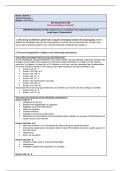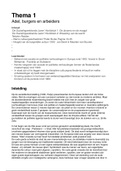The rights of individuals in criminal investigation are contained within the Police and Criminal Justice Act 1984
(PACE), under S24 – this section of the act addresses the rights the police have, in relation to suspects, when
investigating a crime, this may include right to arrest people without a warrant if: there are reasonable grounds, the
person has committed a crime, is currently committing a crime, or is about to commit a crime, S24 further develops,
as it also has to be necessary to make an arrest under S25(5). At this initial point of arrest, the suspect has the right
to be informed that they are being arrested as well as why and explained why the arrest is necessary.
Rights of Suspect
Stop and search is usually the first step, and the first contact that will have. Unless, of course, the Police already have
a reason to be looking for you. To be able to stop and search you the Police have to have a strong, sound reason for
doing so, for instance they have a reasonable suspicion to suspect you of committing a crime. They cannot just stop
you on a whim, or because they are looking for something to do. Police have 19 different powers to stop and search
such as drugs, firearms, in some cases police also have powers to search vehicles and premises. As the person being
searched you have the right to ask them to explain the basis upon which you are being searched. A right is
something which you are morally and legally entitled to. If they do not have a valid search power (i.e. cannot justify
their suspicion) then you are entitled to refuse. This does not apply if you are entering a building or area that has a
search as an entry condition. Whether under arrest or not, police may lawfully arrest you as a suspect without
warrant from a court under S24 of the Police and Criminal Evidence Act 1984. But in order to arrest under Code G of
the Codes of Practice, police have to have reasonable grounds to arrest which is outlined under the S110 of the
Serious Organised Crime and Police Act 2005. if you are interviewed by the Police then you have the right to a
certain level of treatment. The main principle is that people must be dealt with as quickly as possible and released as
soon as the need to keep them has passed. The suspect is taken to a police station for custody, before any interviews
can take place, every person must be assessed for their fitness to answer questions and whether or not any special
treatment or facilities are required, for instance an interpreter or medical examination. Once assessed for fitness
then you must be cautioned, stating that you have the right to legal representation and why you are being
interviewed. The interview will normally be recorded, and you must be given the opportunity to review any
statement that you give. The interview can continue until the Investigating Officer is either satisfied that you have
not committed a crime or that there is sufficient evidence to arrest you pending a formal charge. You have the right
to not have to say anything, but it may harm your defence if you do not mention when questioned something which
you later rely on in court anything you say will be used as evidence by prosecution in the court of law. At the police
station, suspects are handed to custody officer, who will ask for any possession, DNA swabs, photographs, and
fingerprints. However they need authority consent from senior police officer, the custody officer ensure that time
limits on the length of detention are complied with, these include 24hours released if no charges are pressed, 36
hours authorised for indictable offences such as murder, manslaughter, rape. 14 days under the Terrorism Act, and a
further 96 hours can be granted by a lay Magistrate to detail a suspect. At this point on criminal investigation
process, suspects have three main rights under PACE, these are outlined under S56 – right to have someone
informed when arrested, S58 – access to legal advice, and S34 – right to remain silent. Suspects also have the right to
ask for information – such as fingerprints information, and samples which are stores in a police database, you have
the right to ask police to withdraw your information from their database. If a suspect is convicted they have the right
to appeal, however this appeal is different which depends on the court the suspect has been convicted in, if
convicted in magistrates court, defendant appeal to crown court, if convicted in crown court, appeal goes to the
Court of Appeal, appeal would usually not go above this court of law, because the Supreme court deals mostly with
human right cases, and cases of public importance.
Rights of Victims:
When a victim reports a crime to the Police they have to abide by the very strict ‘Code of Practice for Victims of
Crime’. Among other things this code ensures that you will be informed, within 5 days of your report, whether or not
they intend to pursue an investigation. If they do decide to investigate then the victim, have the right to be informed
of their progress on a monthly basis, at the very minimum, until they have finished their investigation. Similarly, if
anyone is arrested and/or charged, then you have the right to be informed straight away. If that person is then
released on bail you have the right to know within 5 days, within a day if you are considered to be in danger. If the
CPS and Police do not investigate, or their investigation does not lead to a conviction that you are happy with then
the victim have the right to take out a private prosecution but this is very expensive. Once the victim have reported
the crime against then there are many ways in which the victim, and their family, are entitled to be protected from










